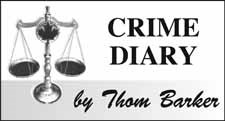Last week, a Canadian Press headline, "Harper not living up to duty to protect Charter: lawyers group" caught my eye.
The erosion of Canada's democratic institutions under Stephen Harper is an issue of great importance to me and should be to all freedom-loving Canadians. So, while the article by Mike Blanchfield, a preview of former Canadian Bar Association president Simon Potter's keynote address to the National Constitutional and Human Rights Conference June 27, was interesting enough, I wanted to see the complete text of the speech.
Fortunately, it was published in a paper called "The Executive Branch: Defender of Canadian Liberties," a very troubling treatise that suggests the current executive is anything but.
Potter and co-author Emily MacKinnon, argue that "the Canadian Constitution and Charter go farther [than giving the executive branch the role of applying policy] and impose a duty on the executive branch to ensure the Charter is respected. We argue that this duty includes a duty to ensure general respect for and confidence in the judicial branch, and that this constitutional duty is much older than the Charter."
They go on to say, "Indeed the Charter makes no sense if it is understood to mean that, while citizens may have rights, they can be ignored by the executive-or that the executive may go about its business as if the Charter did not exist, and react only when brought up short by the judicial branch."
Unfortunately, disregard for the Constitution in passing legislation and animosity toward the judiciary has become all too common under the current government.
The authors comment on some examples-which I have also written about in this column-including the egregious neglect of Omar Khadr and the attempted appointment of Marc Nadon to the Supreme
Court and subsequent attempted defamation of Chief Justice Beverley McLachlin.
These, the authors claim as evidence that the government is failing in its obligation to "encourage generalized confidence in the judicial branch, and to engage in all good faith in the dialogue towards a real progress respectful of our liberties and constitutional guarantees."
It would be bad enough if the government was simply incompetent to recognize whether a bill is Charter compliant, but according to Edgar Schmidt, a former Department of Justice general counsel, officials may actually be under specific instructions not to render an opinion on the constitutionality of proposed legislation.
Potter and MacKinnon reference a 2012 Statement of Claim currently before the Federal Court brought by Schmidt against the attorney general in which the plaintiff alleges the current examination process is both wilfully dishonest and unlawful.
By way of background, the original Canadian Bill of Rights enacted by John Diefenbaker's government in 1960 required the minister of justice to examine "every bill introduced in or presented to the House of Commons, in order to ascertain whether any of the provisions thereof are inconsistent with the purposes and provisions of this part [the Bill of Rights] and he shall report any such inconsistency to the House of Commons at the first convenient opportunity."
In 1972, the deputy minister was given similar responsibilities under the Statutory Instruments Act with respect to all proposed government regulations.
In 1985, following the adoption of the Charter, the duty of the minister to examine bills and report to Parliament was similarly unequivocal although it only applied to government bills, which Potter and MacKinnon suggest may have something to do with why the Harper government has pushed through more private members bills than any other government in history.
Schmidt alleges in his claim that the current policy is " if it is the opinion of counsel in the Department [of Justice] that
a. a provision is likely or even almost certainly inconsistent with the Charter-even if the probability of inconsistency is 95% or more-but
b. some argument can be reasonably be made in favour of its consistency-even if all arguments in favour of consistency have a combined likelihood of success of 5% or less-,
no advice is given to the Minister that he or she-unless he or she forms a different opinion-has a duty to report to the House of Commons about that provision and therefore no report is made to that House."
To be fair, Schmidt traces this policy to a 1993 interpretation of the law, long before the current Conservative Party of Canada was formed. Nevertheless, he believes the interpretation is wrong and the practice is unlawful.
Potter and MacKinnon argue that even if examining proposed legislation for constitutional compliance was not explicitly codified in law, the legal responsibility is implicit and anything less puts the attorney general in the awkward position of shirking his duty.
"Such instructions would speak of a desire to take away as many freedoms as possible and as much of each as possible," Potter and MacKinnon wrote. "Surely, the constitutional protection we expect from our executive requires that it do the very opposite.
"Such instructions would force the onus of ensuring constitutional compliance away from government and entirely onto the individual-the person who is meant to be protected, not burdened, by the rule of law, and who is ill-suited to hold to account the bottomlessly-pocketed state. With an executive failing to exert itself to ensure constitutional compliance, and indeed finding ways to protect its blissful ignorance, many unconstitutional acts will slip through which should be filtered and many will go unchallenged-though rights have been violated."
If Schmidt is right, the Conservatives may not be responsible for the 1993 interpretation and current policy, but given how many court challenges they have already lost on Charter issues, they appear to have taken advantage of it at every turn. And given the prospect of all the laws that have yet to be challenged in court, including new prostitution legislation for which there was no consultation and the (un)Fair Elections Act, it could take decades to clean up the mess Harper has wrought.
The Federal Court will start hearing Schmidt's case in October.




